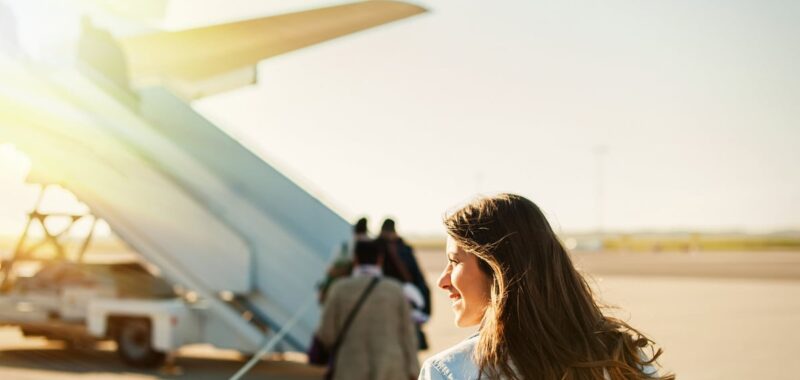Most people don’t fly all too often. Americans took an average of 1.4 air trips in 2021, according to research by Gallup. There are travel enthusiasts who fly much more, but the typical person does it once or twice a year.
If airfare booking isn’t something you do regularly, you might not be sure how to get the best deals. You could also make mistakes and end up paying more than necessary. Here are the most common ways people overpay for airfare, starting with not using travel credit cards to save on their bookings.
1. Always paying with cash instead of travel rewards
There’s nothing wrong with paying for airfare in cash. But if you fly regularly, having a travel rewards card is a big help. Instead of paying cash for every flight, you’ll be able to book at least some of your trips with points or miles.
If you normally stick with the same airline, you could open an airline credit card with it. You’ll then earn miles on your credit card spending. Another option is to open a more all-purpose travel card that’s not tied to one airline. Many travel cards let you transfer your points to a dozen or more partner airlines.
Ready to start saving on flights? Check out our list of the top travel rewards cards to learn more and find the one that fits you best.
2. Not comparing fares on different dates
Whenever possible, it’s better to shop around and see how much flights cost on a few days. For example, I recently booked a business-class flight with Air France. Prices were about $1,800 on Dec. 21 and 22. They dropped to $1,200 on Dec. 23, because there was a special promo fare available. That’s $600 in savings, just from adjusting travel dates a bit.
Many airlines have a fare calendar you can use to see what the lowest prices are on each day. You can check prices in cash or miles this way, so fare calendars are useful no matter how you’re paying for your flight.
One of the most frustrating parts of flying is getting nickel and dimed with various fees. Need to check a bag? Most of the major U.S. airlines recently raised their fees to $35 for the first checked bag. That applies on each leg of your trip. Checking a bag on a roundtrip flight would cost an extra $70.
Other common fees include seat selection fees, change and cancellation fees, and carry-on baggage fees. The fees you pay depend on the airline and the fare you choose. Basic economy tickets may only include a seat and a personal item, and everything else costs extra.
Here’s what you can do to avoid airline fees — or at least keep them to a minimum:
- Check what’s included with a ticket before you book it.
- Figure out the real cost of a basic economy ticket, after adding the cost of any extras you need, such as carry-on baggage.
- If you usually check a bag when you fly, consider getting an airline credit card that includes a free checked baggage perk.
- Weigh your luggage after packing to ensure it’s under the limit. Otherwise, the airline could charge an overweight baggage fee.
4. Waiting until the last minute to book
Travelers who book at the last minute often find themselves paying more. Christie Hudson, an Expedia travel expert, told Travel & Leisure that summer travelers who booked domestic travel zero to six days in advance paid $100 more than those who booked about a month in advance.
If there isn’t much availability left, airlines generally raise prices for last-minute bookings. And at that point, you don’t have the luxury of waiting for prices to decrease.
Sometimes late deals are available, especially if the flight isn’t that full. But it’s good to start shopping for airfare earlier — ideally at least a couple of months in advance, and potentially at least three to six months ahead of time for international airfare. When you have more time, you can shop around, and you’re not pressured to book right away.
Whether you fly once a year or once a month, avoiding these mistakes could help you save hundreds of dollars. Now that you know about them, you can make sure you don’t pay any more than necessary on your trips.

